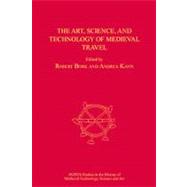
The Art, Science, and Technology of Medieval Travel
- ISBN13: 9780754663072
- ISBN10: 0754663078
- Format: Hardcover
- Copyright: 2008-10-28
- Publisher: Routledge
-
Your order must be $35 or more to qualify for free economy shipping. Bulk sales, PO's, Marketplace items, eBooks and apparel do not qualify for this offer.








